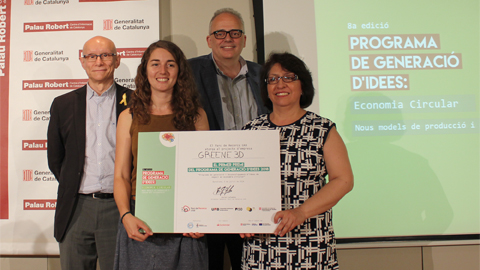Greene3D awarded best initiative of circular economy by the Generalitat and PRUAB

06/07/2018
The Ministry for Territory and Sustainability of the Government of Catalonia and the UAB Research Park (PRUAB) awarded prizes to the two winning projects of the eighth edition of the Generating Ideas Programme, an initiative to provide tools to the research staff and PhD candidates in the creation of innovative solutions in the circular economy.
The first award, which includes a cash prize of €2,500 and six months in an incubator at the Eureka Building of the UAB Research Park, went to the project Greene3D, which combines innovation and circular economy. Laura López Mir, Doctor in Materials Physics by the Institute of Materials Science of Barcelona (ICMAB), and Beatriz Espinosa Aquino, PhD student at the Institute of Environmental Science and Technology at the UAB (ICTA), proposed the development of a sustainable material for 3D printing from organic and bioplastic waste.
They propose to use as waste olive stones, a resource that is very abundant and accessible in Spain. Currently, olive stones are already used as a biofuel, as an additive for cement and ceramics or as a heavy metal filter. The two entrepreneurs add the advantage of customized manufacturing that offers 3D technology. The potential applications of the material include the absorption of heavy metals, air filtering or light industrial panels as acoustic and thermal insulators.
The second prize of the programme, which consists of €1,500 and 6 months of incubation in the Eureka building, was given to Cerclab, led by Marta Santamaría, researcher at the Polytechnic University of Catalunya (UPC) and Gerardo Ezequiel and Erica Volpini, partners founders of Semilla. This is a 4.0 laboratory that aims to take advantage of recycled plastic to create new valuable products. From a perspective of social and collaborative innovation, Cerclab includes a physical space for the recovery and transformation of recycled plastic from packaging waste.
The project also contemplates designing an open innovation web platform to offer social and technological innovation courses, and foster collaborations and synergies among users by promoting the socio-occupational integration of people in risk of exclusion.
The projects were evaluated by a jury formed by Iván Martinez, Deputy Executive Administrator for Research at the UAB; Mireia Cañellas, Project Manager for Sustainable Development of the Ministry for Territory and Sustainability of the Government of Catalonia; Konstantinos Kourkoutas, Coordinator of the CORE Smart and Sustainable Cities of the UAB; and Joan Fresno, Technical Manager of the Consortium for Waste Management of Vallès Occidental.
More Innovative Circular Economy Projects
Other projects were also presented as part of the Generating Ideas Programme:
ACUREM: this project developed a biological product capable of decontaminating aquifers contaminated by organochlorine compounds. The project was launched by Ernest Marco, lecturer of the Department of Chemical, Biological and Environmental Engineering of the UAB, and Romina Avila, PhD student at the UAB. The proposed treatment is based on a natural consortium highly enriched with bacteria which can transform toxic and cancerous compounds such as trichlorethylene and dichloromethane into inoffensive compounds such as ethylene and acetate.
BeWater: Silvia Chellini, Beatriz Corzo and Pablo Bou created a decentralised floating desalination plant which permits turning salt water into drinking water. This mobile platform would be located in the water near the coastline and powered by wind turbines and could meet the seasonal water needs of coastal cities.
Water Filter & Feathers: the project aims to lengthen the useful life of poultry feathers through a system of circular economy. It proposes using the feathers as a filter to clean textile industry wastewater, allowing it to be reused within the manufacturing process. It was created by researchers from the UAB Department of Chemistry Cristina Palet, Montse Resina, Iris H. Valido, Mara Jesús Sánchez and Montserrat López-Mesas, and Fernando Carrillo from the UPC Department of Chemical Engineering.
ZIN: based on the creation of a single multilingual network of human resource services and business tourism operators with the maximum of sustainability and social responsibility and in accordance with the circular economy, certification services, and the evaluation and promotion of these criteria. Behind this project are the entrepreneurs Vera Stegun, Amanda Martínez and Raúl Punzano.